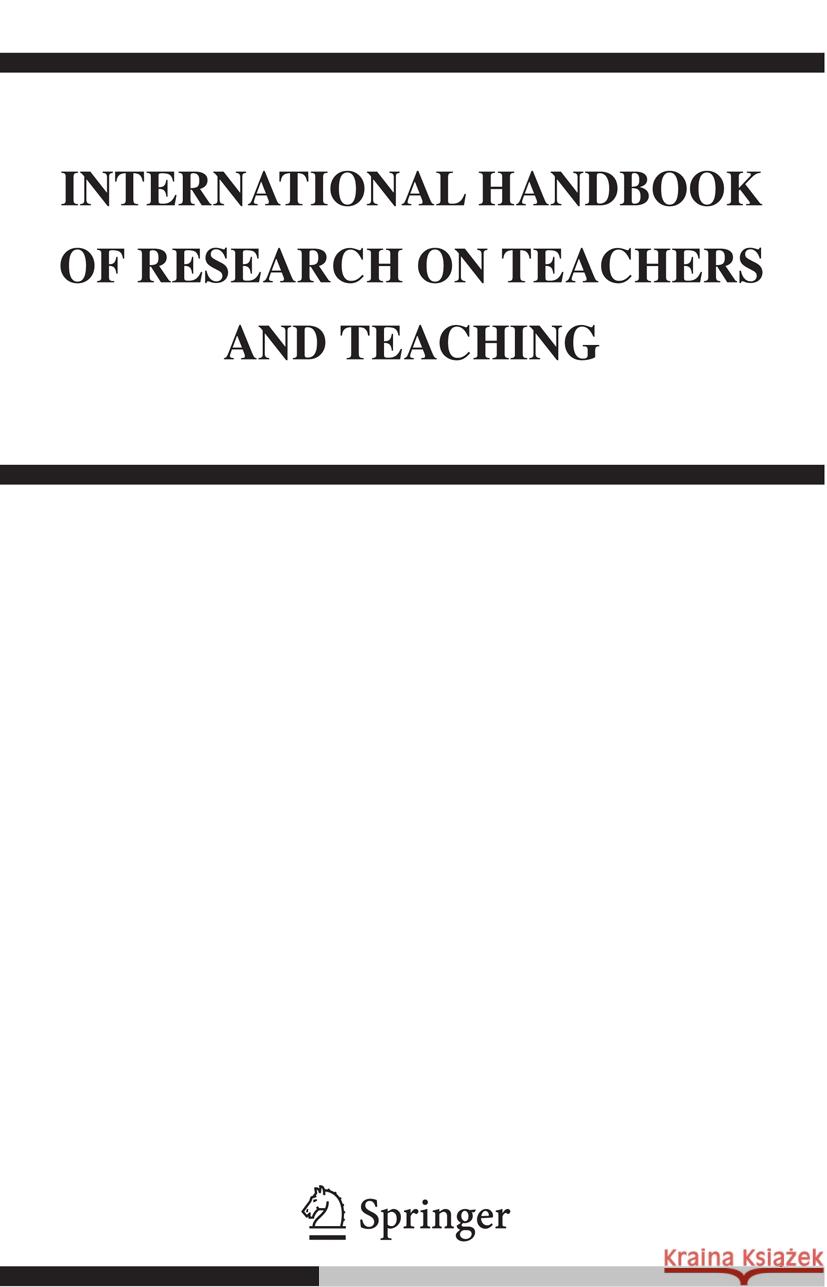International Handbook of Research on Teachers and Teaching » książka



International Handbook of Research on Teachers and Teaching
ISBN-13: 9781489977472 / Angielski / Miękka / 2016 / 1219 str.
International Handbook of Research on Teachers and Teaching
ISBN-13: 9781489977472 / Angielski / Miękka / 2016 / 1219 str.
(netto: 3450,56 VAT: 5%)
Najniższa cena z 30 dni: 3277,22
ok. 22 dni roboczych.
Darmowa dostawa!
CONTENTS Part One Introduction to the Handbook 1 Introduction: New Perspectives on Teachers and Teaching Lawrence J. Saha and A. Gary Dworkin 2 Teachers in History W. Robert Houston 3 Trends in Research on Teaching: An Historical and Critical Overview Margaret D. LeCompte 4 Teacher Research and Teacher as Researcher Cheryl J. Craig 5 The Dissemination of Knowledge about Research on Teachers, to the Teachers Lawrence J. Saha 6 Social Science Theories on Teachers, Teaching, and Educational Systems Jeanne H. Ballantine and Joan Z. Spade 7 Developments in Quantitative Methods in Research into Teachers and Teaching J. P. Keeves and I. G. N. Darmawan v 3 15 25 61 71 81 103 Saha_FM.indd v 9/22/2008 2:25:04 PM vi Contents Section 2 Becoming a Teacher 8 Teacher Preparation Programs Kathryn M. Borman, Elaine Mueninghoff, Bridget A. Cotner, and Phyllis Fredrickson 123 9 Teacher Certification and Credentials: From a Focus on Qualification to a Commitment to Performance Imig Scott, Koziol Stephen, Pilato Virginia, and Imig David 141 10 The Continuing Education of Teachers: In-Service Training and Workshops Robert V. Bullough, Jr 159 11 The Role of Mentors of Preservice and Inservice Teachers Jo Blase 171 12 The Lifelong Learning Issue: The Knowledge Base Under Professional Development? Bruce Joyce, Jim Wolf, and Emily Calhoun 183 Section 3 The Characteristics of Teachers 13 The Status and Prestige of Teachers and Teaching Linda Hargreaves 216 14 The Political Orientations of Teachers Mark B. Ginsburg and Sangeeta G. Kamat 231 15 Dimensions of Quality in Teacher Knowledge Michael J. Lawson, Helen Askell-Williams, and Rosalind Murray-Harvey 243 16 Teachers’Values in the Classroom Clodie Tal and Yoel Yinon 259 17 Footnoes to Teacher Leadership Mark A. Smylie and David Mayrowetz 277 Contents vii 18 Sex Segregation and Tokenism Among Teachers Barbara J. Bank 291 Section 4 Teacher Behavior 19 The Classroom as an Arena of Teachers’Work Margaret Freund 304 20 Teachers andDemocratic Schooling Thomas Tse Kwan-Choi 319 21 Teachers and Parents Mavis G. Sanders 331 22 Teacher Commitment Nordin Abd Razak, I. Gusti Ngurah Darmawan, and John P. Keeves 343 23 Teachers’ Beliefs About Student Learning and Motivation Julianne C. Turner, Andrea Christensen, and Debra K. Meyer 361 24 Teachers and the Politics of History School Textbooks Joseph Zajda 373 25 Teachers’ Emotion Regulation Rosemary E. Sutton 389 26 Principal and Teachers Relations: Trust at the Core of School Improvement Pamela R. Hallam 403 27 Teacher Misbehaviour Ramon (Rom) Lewis and Philip Riley 417 28 School Administrator Mistreatment of Teachers Joseph Blase 433 viii Contents Section 5 Teacher life-cycles 29 Tracking Teachers Sean Kelly 459 30 Teachers’Work, Power and Authority Terri Seddon and Phoebe Palmieri 463 31 Teachers as Professionals: Salaries, Benefits and Unions Nina Bascia 481 32 Teacher Burnout and Teacher Resilience: Assessing the Impacts of the School Accountability Movement Anthony Gary Dworkin 491 33 Teachers and Promotion: Research Evidence on the Role of Gender, Career Intentions, Promotion Criteria and Teacher Satisfaction Ping-Man Wong 511 Section 6 Teachers and Teaching in comparative perspective 34 Teachers in Comparative Perspective Anthony Clarke 527 35 Comparative Perspectives on Teachers, Teaching and Professionalism Mark B. Ginsburg and Nagwa M. Megahed 539 36 Teachers and Teaching in Eastern and Western Schools: A Critical Review of Cross-Cultural Comparative Studies Yanping Fang and S. Gopinathan 557 37 Teachers and Teaching in Africa Lawrence Chi Awasom 573 38 Greek Cypriot Teachers and Classroom Diversity: Intercultural Education in Cyprus Elena Papamichael 605 Contents ix Part Two Section 7 Dimensions of Teaching 39 Three Sides of Teaching: Styles, Models, and Diversity Bruce Joyce and Emily Calhoun 625 40 Creating Productive Learning Environments in Culturally Pluralistic Classrooms Revathy Kumar and Stuart Karabenick 633 41
Dr. Saha is a sociologist of education with 30 years experience in teaching and research. He has had extensive editorial experience. He was section editor (Sociology of Education) and contributor for the International Encyclopedia of Education, 2nd edition (Elsevier, 1994), and Editor of the International Encyclopedia of the Sociology of Education (Elsevier, 1997). His most recent work is The Untested Accusation: Principals, Research Knowledge, and Policy Making in Schools (Ablex Publishing Co., Westport Conn., 2002, with Bruce J. Biddle)). He currently is Editor-in Chief of Social Psychology of Education: An International Journal (Springer).
Dr. Dworkin is a sociologist of education with 30 years experience in teaching and research. He is former chair of the Department of Sociology and has had close links with the Department of Education at the University of Houston. He is an expert on teacher burnout and has an international reputation. He is currently a member of the Sociology of Education Section He was the founder of Sociology of Education Research Group (SERG) at the University of Houston. He has published widely in the area of teacher burnout as reflected in two major publications, Teacher Burnout in the Public Schools (State University of New York Press, 1987) and Giving Up on School (Corwin/Sage, 1991, with Margaret D. LeCompte). Recently he has been conducting research on the affects and implications of standardized testing of achievement in Texas schools. Most recently, Dworkin and his SERG colleagues have prepared papers on TAAS performance and on retention in school for the Brown Center for Education Policy at the Brookings Institution in Washington, D.C. One each of his Brookings Institution papers were published in Diane Ravitch’s (editor) Brookings Papers on Education Policy: 2002 and John E. Chubb and Tom Loveless’ (editors) Bridging the Achievement Gap (2002).
1997-2026 DolnySlask.com Agencja Internetowa
KrainaKsiazek.PL - Księgarnia Internetowa









